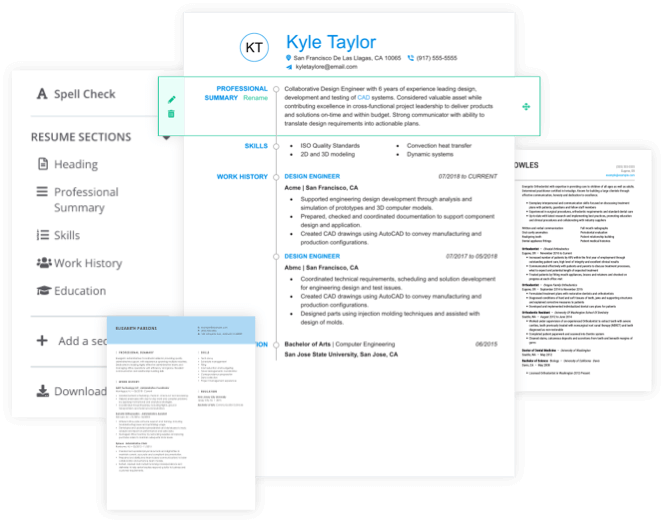- Featured in:

System Architects design, configure, operate and perform maintenance on networking and computer systems — including hardware, software, web portals, internet and intranet connections, firewalls, servers, and security — that allow company infrastructures to function. They consider the size, resources, data needs, desired user experience and budget of each company to determine its computing needs.
Tasked with the overall design and maintenance of an IT system, System Architects must be knowledgeable in this area of expertise. System Architects can locate job opportunities in small, medium and large firms and companies and as independent contractors. Demand for System Architects is expected to increase 9 percent through 2024, the Bureau of Labor Statistics reports.
Need cover letter guidance? Add a cover letter to your resume using our cover letter formats how-to guide and add value to your resume.
Impress your future boss! According to a 2020 survey, most hiring managers read cover letters for candidates they’re considering interviewing before making their final decision. Make a cover letter that seals the deal with our professionally designed cover letter templates.
System Architect Duties and Responsibilities
To accomplish their main functions of bringing together the pieces — or architecture — of a system while ensuring that current and future performance and scalability are achievable, System Architects perform a wide range of tasks. We examined various job listings to identify these main System Architect duties and responsibilities.
Strategy & Planning
System architects are responsible for designing and implementing short and long-term strategic goals for managing and maintaining systems and software. In addition, they must make sure that all planned and in-place system architectures are aligned with the specific firm's goals. They provide their expertise and architectural assistance to other IT personnel including software teams, System Analysts and Engineers. They conduct research on new technologies in the field of systems development and create and develop plans for investing in such systems that will increase cost effectiveness and flexibility.
Acquisition & Deployment
In this area of responsibility, System Architects design, create and monitor the implementation of end-to-end integrated systems. They also review new and existing system designs and make recommendations for improving or altering the systems. Negotiating and administering vendor and consultant contracts is also key in this area.
Operational Management
System Architects consult with department heads and end-users to further infrastructure development. They develop and execute test plans to check technical performance of infrastructure and report findings. Based on findings, they make recommendations for improvement. They also develop policies for standardizing systems and manage many of the aspects of IT staffing.
Integrity of Systems
The System Architect is tasked with a balanced and focused development of the system and its maintenance no matter if requirements change. For example, if a reduction in cost is required, the System Architect must not sacrifice the system's performance or reliability.
System Architect Skills
Professional Skills
- Extensive experience in the development and implementation of computer systems and networks as a System Architect
- Working knowledge of DNS, SMTP, IIS 6&7, SQL 2005, Active Directory, and MSMQ
- Solid understanding of Object-Oriented Programming, coding for large scale web or client-server applications and design and development of application service layers
- Proficient with Windows Server 2008, Windows 7 and VMware ESX 4.0 and developing a LIMS mandate website using ASP.NET MVC 4.0
- Proven experience developing strategic system architecture plans
- Extensive experience in system and network creation and development
- Solid understanding of information processing fundamentals and best practices
- Above-average analytical, conceptual and troubleshooting abilities
- Excellent written and verbal communication skills
- Experience conducting technology, trends, standards and products research
- Solid track record in prioritizing and executing tasks when under extreme pressure
- Experience providing guidance and leadership to novice systems engineers
- Proven experience identifying, analyzing and resolving system problems
- Familiarity and expertise in a variety of programs
Tools of the trade
System Architects must utilize various tools each day. If your goal is to become a System Architect, you should be knowledgeable about the following:
Computer servers– Be familiar with DNS, file servers, mail servers and NAS equipment
Network switches– Computer network switches; voice switches, LAN and WAN switches
Load balancers– Be familiar with both load balancers and network server load balancers
Network analyzers – LAN and WAN analyzers, network connectivity testers and ATM analyzers
Network channel or data service units – Know about channel banks and network CSU and DSU
System Architect Education and Training
According to our analysis of online job postings, most employers are seeking System Architect candidates who have a bachelor’s degree in areas such as computer science, engineering or information systems and eight to 10 years of related work experience. Candidates with associate’s degrees in related fields and at least 12 years of experience are also considered by some employers. Those candidates without a degree of any kind usually must have at least 15 years of related experience in an IT discipline, and the field is not as accessible to these candidates. The best path for someone with no degree to achieve a System Architect position would be to work his way up through a company to gain experience and recognition. Be advised that requirements for System Architect positions will differ from company to company.
System Architects Salary
The median annual salary for System Architects, categorized by the BLS as Computer Network Architects, is approximately $101,000. System Architects in the 10th percentile earn about $55,000 annually, while the highest paid make in excess of $158,000 per year. System Architects in California, Oregon and New Jersey earn the highest median salary rate in the U.S. – $125,340, $121,250 and $120,150, respectively.

System Architect Resources
Jeff Dean
Dean co-designed and implemented five generations of Google's crawling indexing and query retrieval systems.
CaSE
This podcast, which releases new episodes every three weeks, is targeted at software developers and system architects who enjoy software engineering and related topics.
Cloud Unfiltered
Join host Niki Acosta for her interviews with people who want to advance cloud tech and implementation.
DevOps: A Software Architect's Perspective
This book is for those who want to know how to support a devops culture that's involved with cloud computing.
System Architect Resume Help
Explore these related job titles from our database of hundreds of thousands of expert-approved resume samples:




